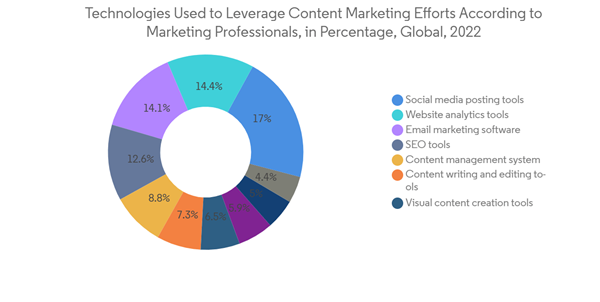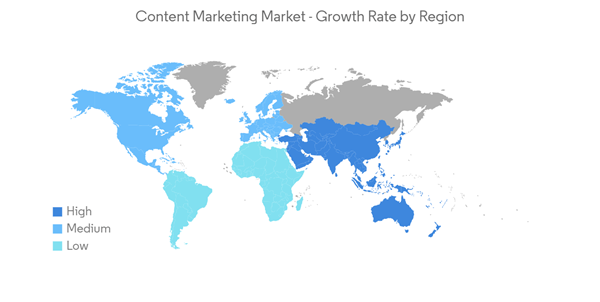Key Highlights
- One key trend that is propelling the growth in content marketing demand is digital transformation. Content marketing has become a vital tool to efficiently connect with and engage internet users as enterprises shift their business focus from traditional channels into digital platforms, such as marketing strategies and client involvement efforts.
- Demand for the market studied is driven by the necessity of a business' presence on the Internet to enhance customer involvement and align marketing strategies with changing consumer behavior. Content marketing has become essential for businesses to connect, engage, and convert their audiences into potential customers as they increasingly rely on digital channels.
- The market is being hampered by a lack of skills regarding content marketing systems that enable the analysis of data from sources. It is a difficult task to choose the right content advertising strategy for meeting consumer demand, which requires creativity and technical skills that are sufficient in order to bring about an impact; this will also impede the growth of the market.
- AI-powered automation gives marketers a competitive advantage, allowing them to spend more time on marketing strategy rather than repetitive and redundant tasks. Thus, the development of AI-based content marketing solutions is expected to present opportunities for content marketing vendors in the coming years to cater to businesses' evolving needs. For instance, in July 2023, SpeedyBrand, an innovative Generative AI platform, raised USD 2.5 million in funding led by Y Combinator and GV (Google Ventures). The funds will be used to further develop and expand an AI-powered SEO content marketing platform designed for small and medium-sized enterprises (SMEs), focusing on the SME market.
- The COVID-19 pandemic has significantly impacted content marketing, reshaping strategies and priorities for businesses globally. People have had to spend more time online due to the pandemic lockdown and social distancing measures. Thus, more people switched to digital consumption, opening up new opportunities for brands to interact with their audiences through different content formats, which increased the need for content marketing software and services.
- The importance of effective digital communications, online engagement, and adaptation of marketing strategies in an evolving consumer market has also been recognized by businesses. The pandemic made the shift to digital channels more rapid while reinforcing the value of content marketing as an essential tool for ensuring brand relevance during a critical time.
Content Marketing Market Trends
Rise of Digital Channels to Drive Market Growth
- As consumers are spending more time online, it becomes essential for businesses to establish a robust online presence to reach their target audience effectively. This leads to increasing adoption of content marketing solutions and services to create and distribute necessary content across various digital platforms by businesses.
- Digital channels support various content formats such as blogging, infographics, case studies, videos, and others, enabling businesses to cater to diverse content consumption preferences. Further, it helps target audiences based on demographics, interests, and behavior. To cater to a broad range of target audiences on different digital channels, the need for businesses to use content marketing solutions becomes important. It is likely to grow in the coming years.
- The rise of digital channels creates an environment where business needs to connect with their target audience on the Internet. This demand will be met through content marketing, which delivers high-quality and engaging content to enhance the presence on the Internet, brand recognition, and customer engagement. Thus, demand for content marketing is rising as companies become increasingly dependent on the integration of content marketing in their digital strategies.
- According to a survey conducted by Semrush, the online visibility management and content marketing SaaS platform provider, in 2022, 58% of responding marketing professionals said they used social media posting tools to leverage their content marketing efforts, while 30% said they utilized a content management system (CMS) for the same purpose.
North America Holds Largest Market Share
- The early adoption of content marketing strategies combined with a well-established market ecosystem positions the region to hold the leading market share. North American businesses have been at the forefront of digital transformation, recognizing the importance of online engagement and brand visibility. As content marketing becomes an essential parameter of digital strategies for businesses, it has resulted in a higher regional adoption rate.
- In addition, the region has a thriving number of marketing agency landscapes that offer businesses content marketing services. Also, the availability of professional expertise is further contributing to the growth of the market in the North American region. According to the U.S. Census Bureau, advertising agencies in the United States generated a total revenue of around USD 57 billion in 2021, an increase of USD 6.24 billion compared to 2020, when U.S. agencies recorded a decline in revenue amidst the COVID-19 pandemic.
- In a November 2022 survey conducted by Parse.ly, one of the leading content analytics platforms for professionals working in Content Marketing, 18% said they were using social media posts as part of their marketing strategy; 13% claimed to have used videos, 7% cited infographics, and 6% relied on case studies. This shows the use of social media posts and video platforms for content marketing is increasingly being adopted.
- With growing demand for content marketing in the region, the companies are entering the market with plans to launch content marketing platforms and services based on new technologies. For instance, in September 2022, Delaware-based Pepper Content Inc. launched a revolutionary AI content creation and ideation tool for marketers built on top of ChatGPT to lead in the next phase of content marketing.
Content Marketing Industry Overview
The content marketing market is fragmented, with a large number of key players operating in the market, including Adobe Inc., HubSpot Inc., Contently Inc., and several others. The players operating in the market are undergoing strategic initiatives such as mergers, acquisitions, partnerships, product launches, and others to remain competitive in the market and constitute significant market share.- November 2022 - UberStrategist, a North American public relations and full-service marketing agency that serves global video game, entertainment, and technology clients, acquired the Raleigh-based content marketing agency VirTasktic.
- February 2022 - GroupM launched the Australian INCA, a purpose-built AI-powered, brand-safe, influencer and content marketing platform. Intuitive data-driven planning, a network of creators, workflow management, content amplification, analytics, and optimization capabilities are the core of INCA's platform. INCA is part of GroupM's portfolio of tech-driven specialty media products that includes addressable TV and addressable content, programmatic, social, and search expertise.
Additional Benefits:
- The market estimate (ME) sheet in Excel format
- 3 months of analyst support
This product will be delivered within 2 business days.










